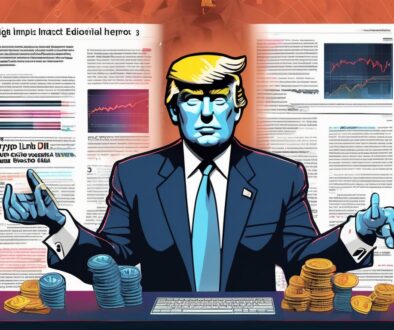Trump’s Lucrative Crypto Venture Revealed

Trump’s Lucrative Crypto Venture Revealed: A $57.3 Million Windfall and the Ethical Storm
In a surprising turn for a figure once skeptical of digital assets, former President Donald Trump has disclosed a significant financial gain from his foray into the cryptocurrency world. His venture, World Liberty Financial (WLF), has reportedly netted him a staggering $57.3 million from token sales, sparking intense debate and accusations of potential conflicts of interest. This revelation, part of a broader financial disclosure, casts a spotlight on Trump’s evolving financial empire, where crypto now plays a notable, albeit controversial, role alongside his traditional real estate and golf businesses.
While the crypto earnings are substantial, they are set against the backdrop of his established ventures, particularly his lucrative golf resorts, which continue to generate significantly higher income. This deep dive explores the specifics of World Liberty Financial, the widespread criticism it has attracted, and how this new digital asset venture stacks up against Trump’s long-standing financial powerhouses.
World Liberty Financial: A Deep Dive into Trump’s Crypto Enterprise
Launched in September 2024, World Liberty Financial (WLF) emerged as a cryptocurrency project co-founded by Donald Trump alongside his sons, Donald Jr. and Eric. The primary goal of WLF was ambitious: to empower the U.S. dollar through the use of stablecoins, aiming to raise significant capital from investors.
Trump’s financial disclosures confirm a remarkable $57.3 million windfall directly from WLF’s token sales. This income stems from his substantial ownership of 15.75 billion governance tokens in the platform, which also grant him voting rights within the venture. The project successfully attracted over $550 million from investors, indicating considerable market interest despite its nascent stage.
However, WLF’s structure has drawn scrutiny. Critics point to the Trump family’s extensive control, raising concerns about the venture’s centralized nature in a space that often champions decentralization. Furthermore, the non-tradable nature of the governance tokens held by the Trump family has added to the debate surrounding the project’s transparency and potential for genuine decentralization.
The Storm of Criticism and Controversy
President Trump’s involvement with World Liberty Financial has ignited a firestorm of criticism, resonating across the political spectrum and within the crypto industry itself. The core of the controversy revolves around potential conflicts of interest, especially given Trump’s prominent political standing and his potential influence on U.S. crypto policy.
- Bipartisan Concerns: Both Democrats and ethics watchdogs have voiced strong concerns. Democrats, in particular, have highlighted the potential for the Trump family to directly profit from policies or decisions made regarding digital assets, creating a perceived conflict between personal financial gain and public service.
- Industry Skepticism: Within the crypto community, WLF has faced skepticism. Some experts worry that such high-profile, politically-linked ventures could inadvertently pave the way for less scrupulous projects, potentially harming the broader crypto space’s credibility. Industry commentators have described WLF’s approach as resembling an “older style of crypto,” raising questions about its innovation and alignment with modern blockchain principles.
- USD1 Stablecoin and Deals: Further concerns intensified around the proposed USD1 stablecoin and a reported $2 billion deal associated with WLF. Senate Democrats have actively sought more information regarding these arrangements, aiming to understand the full scope of potential conflicts between private profit and government actions.
The ongoing debate underscores a critical challenge: how to navigate the intersection of political power, personal wealth, and the rapidly evolving world of digital assets without compromising public trust or creating undue influence.
Crypto vs. Traditional: A Comparative Financial Analysis
While the $57.3 million earned from World Liberty Financial is undoubtedly a significant sum, it’s crucial to put this figure into perspective alongside Donald Trump’s broader and more established financial portfolio. His recent financial disclosures paint a picture of diverse income streams, where traditional assets still reign supreme.
Here’s how his crypto earnings stack up against his other major ventures:
- Golf and Resorts: Trump’s golf business remains a colossal financial engine. His Florida resorts alone generated a staggering $217.7 million. Specific properties like his Miami-area golf club brought in $160 million, Mar-a-Lago contributed $56 million, and his Bedminster golf club added $37 million to his coffers. These figures highlight the enduring financial power of his hospitality and real estate empire.
- Trump Media & Technology Group (TMTG): The parent company of Truth Social, TMTG, holds a valuation of $5.7 billion. However, its reported revenue last year was a more modest $4 million, indicating that while its market valuation is high, its operational income is currently much lower than his other ventures.
- Overall Income: In total, Trump’s various businesses reportedly took in more than $700 million, underscoring the relative scale of his established enterprises. The $57.3 million from WLF, while substantial for a nascent crypto venture, represents a smaller slice of his overall income pie compared to his long-standing business interests.
This comparative analysis reveals that while Trump’s crypto venture has proven lucrative and garnered significant attention, it is currently a supplementary, albeit high-profile, component of his diverse and robust financial portfolio, which continues to be dominated by his traditional real estate and golf businesses.
Conclusion: A New Chapter in Trump’s Financial Story
Donald Trump’s $57.3 million windfall from World Liberty Financial marks a significant and unexpected chapter in his financial narrative. From a self-proclaimed Bitcoin skeptic to a crypto entrepreneur, his journey into digital assets has been swift and highly profitable. However, this success is inextricably linked with a wave of criticism, primarily centered on potential conflicts of interest that arise when political influence intersects with personal financial ventures.
While his crypto earnings are notable, they remain dwarfed by the consistent revenue streams from his long-established businesses, particularly his golf resorts, which continue to be his primary financial powerhouses. The WLF project not only highlights the growing mainstream appeal of cryptocurrencies but also underscores the complex ethical challenges that emerge when high-profile political figures engage with this evolving financial landscape. As the crypto space continues to mature, the scrutiny on such ventures, particularly those involving public figures, is only likely to intensify.


